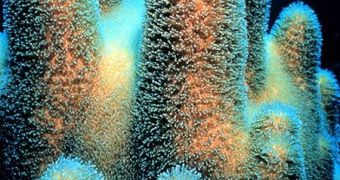Marine biologists announce that the world's coral reefs, endangered by increased, global warming-induced ocean acidification, may be able to endure their ordeal. A team of researchers has just completed a review of some of the most ancient corals in the world, and its members believe that these lifeforms may be very well adapted to surviving in harsh environments. The experts say that, during the course of millions of years, reefs have been subjected to massive influence from the outside world, such as global warming and cooling, drops in sea levels, ice ages, and so on. This new work brings a ray of hope that the organisms will be able to survive the ordeal we're putting them through, PhysOrg reports.
The new investigation was carried out in the Huon Gulf region of Papua New Guinea, on a number of eight fossilized reefs. These organisms faced considerable challenges during the last ice ages, when sea levels dropped to a record-low. It is widely believed that the height of waters in the global ocean was about 120 meters lower than it is today, which means that many reefs were exposed to the atmosphere. Even under these perilous circumstances, a wide biodiversity of corals managed to endure, the new investigation has determined. These enduring organisms were, however, different than their counterparts that did not suffer the effects of sea levels drops.
“Of course, sea levels then were falling – and today they are rising. But if we want to know how corals cope with hostile conditions, then we have to study what happens under all circumstances,” explains University of Queensland professor John Pandolfi. He is also a member of the ARC Center of Excellence for Coral Reef Studies. “We’ve seen what happens to corals in the past when sea levels rose and conditions were favorable to coral growth: we wanted to see what happened when they fell and conditions were adverse. When sea levels drop you get a catastrophic reduction in coral habitat and a loss of connectivity between reefs,” he adds.
“Well, those circumstances are in some respects similar to what corals are experiencing today due to human impacts – so there are useful parallels,” the expert argues. He explains that, during low sea levels, corals tend to grow nearer to the ocean floor, and also at a slower rate than they would in more water. If they are given suitable shallow rocky habitats, corals can endure a wide array of adverse conditions, the researcher adds. But he explains that corals cannot endure everything we throw at them. “[...] the combination of drastic environmental changes that we’re seeing today, such as degraded water quality, depleted fish stocks, coral bleaching, ocean acidification and loss of habitat are unprecedented in the history of coral reefs,” Pandolfi concludes.

 14 DAY TRIAL //
14 DAY TRIAL //